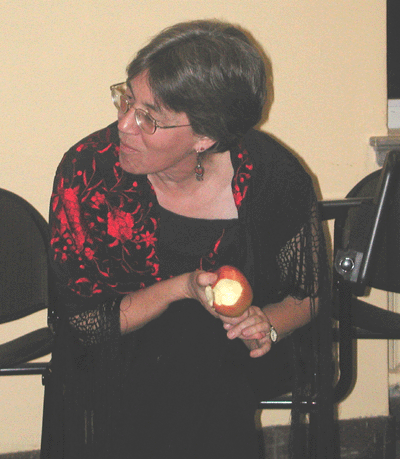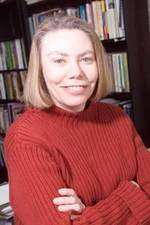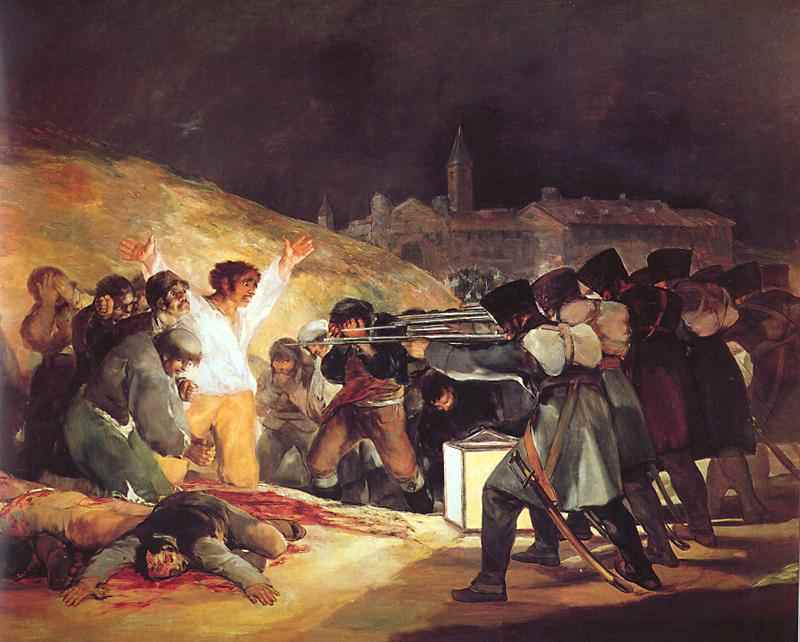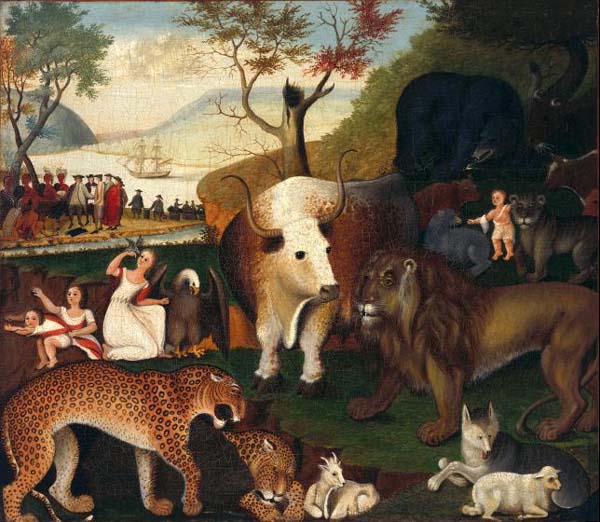Serendip is an independent site partnering with faculty at multiple colleges and universities around the world. Happy exploring!
Notes Towards Day 8: Thinking Back Through Our Mothers

Thinking Back Through Our Mothers

![]()
I. Naming your classmates: time for the test?
II. Going forward: some opportunities-->
7:30 tonight in Carpenter B21:
Hepburn Fellow Sarah Schenck to screen Slippery Slope
7 p.m. Mon, Sept. 28 also in Carpenter B21:
"Pray the Devil Back to Hell," screening followed by a
panel‐led discussion of women, war and peacebuilding.
Created a third "floating forum" where you can
report on your relevant "outside experiences."
Reading for Tuesday: turning to the third "division" of knowledge:
science on diversity of sex and gender;
social science on the diversity of culture and location;
now the humanities on "diversity of representation":
Neil Gaiman's graphic novel, The Doll's House (Vol. 2 of The Sandman)
--and as guide to your reading,
Kathy Acker. "Seeing Gender." Critical Quarterly (Winter 1995),
available @ /~adalke/gasworks
Also, please sign up for a writing conference with me,
to prepare for 2nd paper, due on Sunday a week, Oct. 4 (bumped forward a little):
a 6-pp. paper in which you propose a design for the remainder of the syllabus (days 16-26). Frame the essay with McIntosh's essay or your own first paper; give an account of the work you have already done in (=what you already "know" about) gender and sexuality; continue that account with a response to (@ least) one of the 3 (science, social science or humanities) texts we've read together--how did that expand or challenge what you already knew? Then propose a plan for completing the semester, one that will take you into areas you do not know, and draws on and recommends (@ least) three outside texts, images or sounds to articulate the philosophy and the praxis you'd like to see us explore together. The paper should include a pedagogical, a curricular and a philosophical dimension
On avoiding problems w/ being logged out (after four hours?!) by Serendip
Kate Bornstein cannot alas, visit us Thurs, Nov. 5th (due to her need to be @ Villanova
for her big public performance @ 4)-->shall we cancel class and go as a group? or send some scouts?
![]()
III. Looking backward: afterthoughts about Sherry Ortner's visit?
Alice: I found Sherry Ortner's essay, "Power and Projects: Reflections on Agency" particularly interesting in how it discusses the intersections of "projects". She cited ...Filipina domestic workers in Hong Kong ...discusses the increase in agency, and... power the domestic helpers have in their jobs as they build a sense of community and join organizations that protect their rights.
holsn39: I'm worried that Bryn Mawr's goal may be to 'create citizens,' but it doesn't always support the agenda of an activist aiming to create 'radical citizens'.
ebock: So what is the goal of higher education? ....What would the implications be of adding some kind of required project that takes place in communities around our colleges to the curriculum of the gen/sex program? ...how this idea might play into how I re-envision our "ideal" syllabus for the rest of the semester.
What I hope you'll remember from the last three essays we read:
complex unpredictable intersections/interactions of social life: nothing deterministic here!
"elementary structure of agency": resistance lurks w/in unstable power relations
"Borderland Politics and Erotics":
outcomes of "gender radicalism" of climbing women in all-male institution;
laying bare the "dialectic of sex," when feminist ideology entered mountaineering
(ethnic, national and gendered dimensions of borderland encounter,
but also omission of homelands beyond....)
"Reading America: Preliminary Notes on Class and Culture
Americans shift discourse of class to ideologies of mobility and individualism
gender and sexuality, carrying a secret burden of class meanings,
give a "surplus" antagonism" to such relations
(between working class-identified men, middle class-identified women)
"Power and Projects: Reflections on Agency,"
understood as both power and desire
(with most vivid examples in realm of gender relations)
"culture constructs people but social actors transform the culture that made them"
dynamic, unpredictable relationship between people's practices and society's structures
framework of (ultimately unstable) "serious games"; importance of intentionality
"agency" always part of "structuration" (=making of social formations)
Grimm's fairy tales read as cultural formations of gendered persons
cultural life "on the margins of power": subordinated actors never wholly drained of agency
How is/could Sherry's work be useful to you/yours?
Pointed version of a larger question:
whose work might be useful in addressing your questions?
IV. To model a way of answering this question:
Kristin and I are going to "think back through our mothers" for you,
to tell you, as Sherry did, something about our own evolution in the field of gender studies
intended as an invitation for you to begin thinking about who you need to "meet,"
what directions you'd like us to move in both individually and as a group
what is the history/present/future of the field--
and what parts of it are important for us/you to know?
![]()
Kristin's Origin Stories
Anne's Feminist Trajectory
From Snuggling (1950) and Pushing Off (1980)
 |
 |
To (Witch? Fairy Godmother?)
Offering the Temptation and Threat of the Apple of Knowledge

Some background
The first feminist moment of my childhood:
"Girls, don't look!"
![]()
...Said by my strong-willed (and certain) father
 |
 |
 |
Wearing dresses when going to town (where they could look up our dresses) and
working as a telephone operator (where no one could see us @ all):
the class-inflected genderizing of a lady
 |
Noticing the limits of my mother's life, wanting something bigger:
my legacy her lack of choices.
The largeness of college (for me, as for Sherry:
It was all about the gap....)
But:
Philosophy 101 @ 
Too abtract, too removed from anything I was curious about

College Drop-Out;
Consciousness Raising in rural Maine:
realizing that I was complicit in shaping my own life....

Graduate School in English @ Penn
"The work you are doing is women's studies" (who knew?!)
dss (a la Sherry, though I didn't know it!) on popular sensational fiction:
the motif of unwitting sibling incest as "code" for 19th c. class anxieties

Co-ordinating Feminist and Gender Studies @ BMC (1995-2006):
-
Interacting with (and learning tons from) both social scientists and scientists
-
Teaching English 280: Major Texts of the Feminist Tradition--A Process of Reconstruction
-
Being a "Praxis Pioneer"
-
Confirming, in English 308: The Feminist Difference in Literary Theory
four things I know for sure,
which have guided a good deal of my work for the past # of years:
-
I'm not interested in performing what I know, but in finding out how other people see things
- (Following from that) I'm not interested in fighting
- (Following from that) I'm not interested in the professionalization of literary study
- (Following from that) I'm not interested in theory unrelated to practice.
-
I have had MANY feminist guides and foremothers in this process.
Three of the most important ones are

Susan Bordo. (Professor of English and Women's Studies, University of Kentucky)
"Feminism, Postmodernism, and Gender Scepticism" (1990):
"It is impossible to be 'politically correct' . . . all ideas . . . are condemned to be haunted by a voice from the margins . . . awakening us to what has been excluded, effaced, damaged."

Iris Marion Young (Professor of Political Science, University of Chicago)
"The Ideal of Community and the Politics of Difference" (1990):
"The ideal of community...privileges unity over difference...an understandable dream, expressing a desire for selves that are transparent to one another, relationships of mutual identification, social closeness and comfort. The dream is understandable, but politically problematic...because those motivated by it will tend to suppress differences among themselves or implicitly to exclude from their political groups persons with whom they do not identify....The desire for unity...generates borders, dicotomies, and exclusions....the desire for mutual understanding and reciprocity underlying the ideal of community is similar to the desire for identification that underlies racial and ethnic chauvinism...Our political ideal is the unoppressive city....defined as openness to unassimilatable otherness...Radical politics must develop discourse and institutions for bringing differently identified groups together without suppressing or subsuming the differences."
"Impartiality and the Civic Public"(1987):
"The bourgeois world instituted a moral division of labor between reason and sentiment....sentiment has been thoroughly devalued because it has been excluded from rationality....I am suggesting that only a conception of normative reason that includes the affective and bodily dimensions of meaning can be adequate ....contemporary politics grants to all persons entrance into the public on condition that they...keep their passions private....Liberating public expression means not only lifting formerly privatized issues into the open of public and rational discussions...but also affirming in the practice of such discussion the proper place of passion and play in public."

Virginia Woolf, Three Guineas (1938)
demonstrates that three requests for contributions--
to support women's education, a professional women's organization,
and the peace effort-- are inherently linked:
-
"to emphasize superiority...rouses competition and jealousy...which encourage a dispostion towards war. We can refuse all such distinctions ourselves. (21)
-
Do we wish to join that procession, or don't we? On what terms shall we join that procession? Above all, where is it leading us, the procession of educated men? (62)
-
The professions have a certain undeniable effect upon the professors. They make the people who practise them possessive, jealous of any infringement of their rights, and highly combative. (66)
-
This is an awful mind- and soul-destroying life....Sight goes....sound goes...Speech goes...Humanity goes...Health goes...What then remains of a human being who has lost sight, sound, and sense of proportion? Only a cripple in a cave. (70-2)
-
How can we enter the professions and yet remain civilized human beings...who wish to prevent war? (75)
-
[She ends w/ a refusal] to be separated from the four great teachers of the daughters of educated men--poverty, chastity, derision and freedom from unreal loyalties." (79)
"to emphasize superiority...rouses competition and jealousy...which encourage a dispostion towards war. We can refuse all such distinctions ourselves. (21)
Do we wish to join that procession, or don't we? On what terms shall we join that procession? Above all, where is it leading us, the procession of educated men? (62)
The professions have a certain undeniable effect upon the professors. They make the people who practise them possessive, jealous of any infringement of their rights, and highly combative. (66)
This is an awful mind- and soul-destroying life....Sight goes....sound goes...Speech goes...Humanity goes...Health goes...What then remains of a human being who has lost sight, sound, and sense of proportion? Only a cripple in a cave. (70-2)
How can we enter the professions and yet remain civilized human beings...who wish to prevent war? (75)
[She ends w/ a refusal] to be separated from the four great teachers of the daughters of educated men--poverty, chastity, derision and freedom from unreal loyalties." (79)

Goya's Third of May, from Art and Society Through the Ages, Archbishop Williams High School |

Hicks's The Peaceable Kingdom, from Fine Arts Museums of San Francisco |
Turning it over to the next generation--
what have you been "generating,"
as we have been talking?
Which "feminist foremother" is going to be the most help to you,
@ this juncture of your own thinking-and-writing?
If you are as yet motherless,
what kind of mother are you looking for?
That is, what do you need someone to help you think about?


